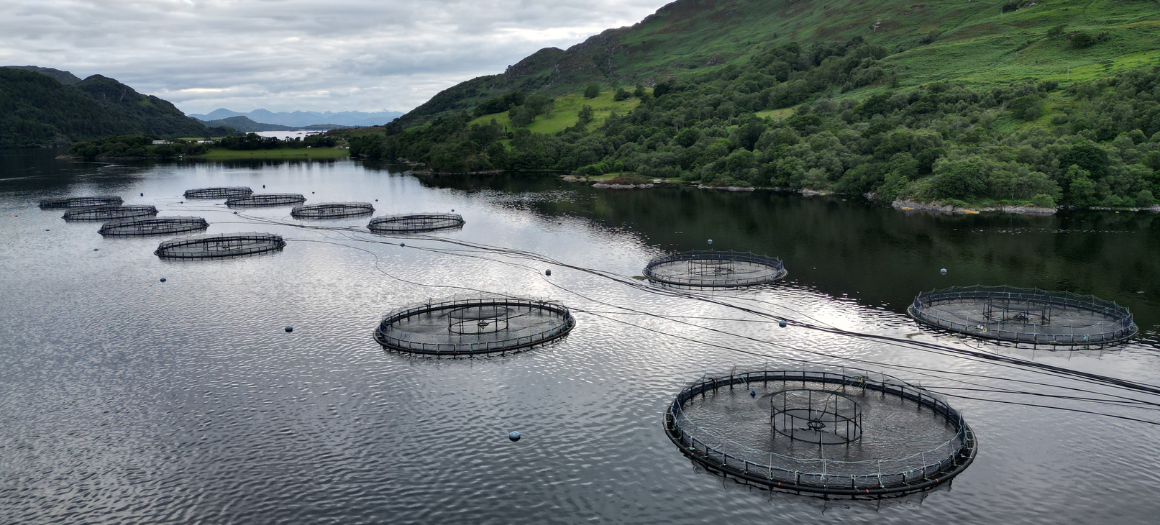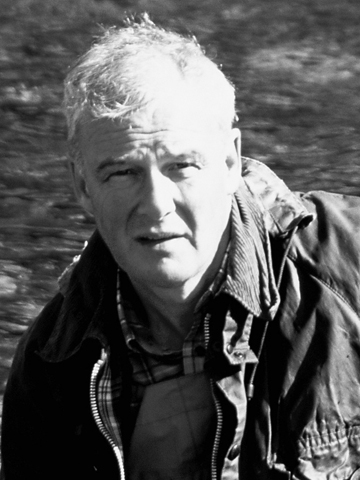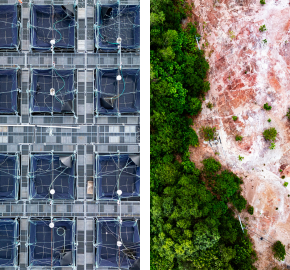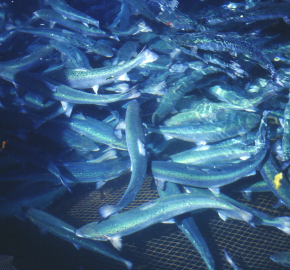River Carron in Wester Ross downgraded to “poor” conservation status

Every year in late summer the Scottish Government launches a consultation exercise on its proposed salmon conservation grades for rivers in the following year. The proposals are based on an annual assessment of the probability of a river meeting its “conservation limit”.
Grading the conservation status of rivers
Rivers are graded against three levels of conservation status:
- Good (Grade 1: “exploitation is sustainable”).
- Moderate (Grade 2: “management action is necessary to reduce exploitation”).
- Poor (Grade 3: “exploitation is unsustainable, therefore management action, including mandatory catch and release, is required to reduce exploitation”).
It is very rare for the final gradings (which are confirmed into law before the start of the new season) to differ from those proposed in the consultation. Gradings are based on catch returns (which are used as the basis for calculating the probability of a river’s stock meeting its conservation limit) from the previous five-year period – so 2025 gradings reflect catch returns from 2019 to 2023.
Grading proposals for the 2025 season
The consultation for the 2025 season gradings proposes that four rivers (including the Clyde) will no longer require mandatory catch and release, whilst nine rivers will become mandatory catch and release fisheries. There are two standouts in the latter. The inclusion of Endrick Water, that flows into Loch Lomond, is significant because its Special Area of Conservation (SAC) status means that NatureScot will have to tread very carefully, under the terms of the Habitats Directive, in responding to salmon farming planning applications in the Firth of Clyde, to ensure that the river’s stocks are not jeopardised any further.
The other notable inclusion in the list of rivers being downgraded from Grade 2 to Grade 3 is the River Carron at the southern end of Wester Ross, an area that is a salmon farming hub including a 2,000 tonnes maximum biomass farm in the adjacent sea loch (Loch Carron).
Some background to the Carron’s downgrading
In response to very low rod catches in the 1990s, a massive and very expensive stocking programme (some 150,000 fed-fry annually), funded by proprietors and critically local salmon farming interests, was established and still continues today.
Catches increased markedly from 2004. The annual average declared catch from 2004 to 2009 was 200 salmon and grilse, rising to an annual average of 272 during the ten years from 2010 to 2019. However, the sequence of catches from 2020 to 2023 (85, 74, 61, 57 – an annual average of 69) indicates a major downturn, prompting the Carron’s downgrading.
It is now apparent that, while the intensive stocking and “ranching” exercise may have boosted numbers in the short-term, it is not a long-term solution.
The long-term sustainability of wild salmon in Scotland
Partly fuelled by a relentless publicity campaign (driven by those behind the stocking), the Carron’s short-lived ‘recovery’ has been hailed by salmon stocking advocates and some salmon fishing influencers as a universal example of how to counteract declining numbers. It has been trumpeted as a blueprint for restoring wild stocks by the salmon farming industry and its propagandists; bizarrely, it was even given a “conservation award” just days before the new proposed gradings were announced.
It is surely time for a reality check and for these salmon stocking proponents to recognise that the real priority, with the aim of achieving long-term sustainability, should be to address, as far as is feasible, the underlying problems that negatively influence salmon abundance. Including, in the west Highlands and Islands, the insidious but deadly impacts of salmon farming.
Follow the link below to find out more about our campaign to end open-net salmon farming in Scotland.
Find out more





The chances of any action being taken by government agencies to improve salmon stocks are nil. Therefore stocking is required to maintain a stock of salmon in the river. Suggest you study the results achieved by the River Cree hatchery.
We understand fully that hatchery work on the River Cree is designed to mitigate the deadly impacts of acidification (a consequence of poor forestry practices) in the upper parts of the catchment. Our consultant Andrew Graham-Stewart researched and wrote about this at length in an article “Death by trees” in the May 2008 issue of Trout and Salmon. It is also clear from Jim Coates’s interview with Cree hatchery co-ordinator Murdo Crosbie (September 2023 issue of Trout and Salmon) that great care is taken to maintain genetic fitness. In parallel, there is continuing work to improve habitat – not least by better forestry practices such as wider buffer strips along spawning burns to reduce acidification levels.
How can this be….The Carrons been held up as the way forward for all Scottish rivers to go ….We read about it all the time they have just received an award from the SGA for their conservation work ….So what’s happened… Have the Government got their gradings wrong for the river….I am confused… Why would the SGA give them an Award…
Andrew , We were not directly funded by the Fish Farmers ( I’ll double check, sponsorship of a couple of reports but not Hatchery, Scotland Salmon are funding UHI to read next batch of DNA for us)
! Not Expensive ( No sheds / Electric power ) Decent numbers of MSW in system last two years . No Grilse for the last 2 years ( Over 400 seals @ Kishorn ) good smolt run through Screw Trap plenty parr and Bob has just caught 28 SeaTrout / Finnock , only one Louse !
Andrew our biggest challenge in the last 40 years has been Climate Disruption, sadly the scientific community have been slow to pick up on , followed by predation.
Escaped Norwegian Salmon from local Farms has not helped our genetic integrity ( our 11,000DNA samples show low Norwegian genetics ( Wild will prevail)
West coast Carron is not a template for other River Systems other than perhaps those close to extinction. Bob’s work may be of interest to systems facing similar challenges.
Fish Farming is a challenge particularly with ownership changing so often , they have some serious problems. We take a pragmatic view in light of their economic importance locally . We monitor a Smolt Run and request safe passage. It seems to work. 30 years ago we were told by good & great that any Smolt would be dead by Strome with Sea Lice !
We were told the recovery was natural, hence the DNA work .
Redd wash out is in our System a huge problem. So we can have 2000 returning Salmon in a good year and a couple of big Spates in Jan Feb and no Fry emerging( Eggs all heading to Skye ) we might this year have as few as 400 mainly MSW fish spawning and end up after a good cold winter with no large spates recorded on new Kelso Sepa gauge , and have a good number of Fry in June
Marine Scotland grading system is still neglecting the Climate issue.
Andrew feel free to contact us , the door is always open.
Best wishes
Shaun
Ps Did you know our Grilse go round the South of Ireland
We endorse that the stocking programme on the Carron should not be viewed or adopted as a universal “template for other river systems”. We hope you would also agree that an endless hatchery cycle poses significant risks to the genetic “fitness” of the river’s wild stock. On speaking to Andrew, he is amazed and fascinated by Shaun’s statement that “our grilse go round the south of Ireland” and aims to take up Shaun’s invitation to contact him.
This is a poorly constructed article with an obvious anti- hatchery/intervention theme.
The general context of the declining salmon situation in past few years has not been highlighted here and typically the anti hatchery bandwagon bus rolls in again filled with the usual defeatist and over critical rhetoric.
The bias is polluting the management of salmon fisheries in Scotland and beyond. How are the rivers with out hatchery intervention fairing on the west of Scotland?
Here are a few things to consider –
1. The program on the carron continues as in previous years so the idea that it’s short term is missing the point entirely. Any reduction in numbers is likely due to external factors such as reduced sea survival.
2. I was a student who spent most of 2001 fishing on the Carron, despite a huge fishing effort the “wild” salmon stock was at an all time low, far worse than the numbers we see in the Carron today. We managed just 9 wild salmon that year, such was the natural state of the salmon numbers on the river pre – hatchery intervention.
Extreme redd washout was then and continues to be a major problem on not just the Carron but many of our salmon rivers due to unprecedented winter floods.
3. The seal population in Lochcarron and the surrounding coast line is at an all time high.
That coupled with the droughts experienced in recent years have undoubtedly reduced not only the number of returning salmon but has also reduced the anglers ability to catch salmon (the rod catch).
You well know that the Carron is a spate river, very dependent on the right water conditions in the summer months.
The salmon runs in general are concentrated into June and July throughout most of Scotland now, get the wrong conditions then and the rod catch won’t give any indication of the health of a rivers stock.
4. The warm sea temperatures have most likely increased sealice infestation from the farms you refer to which have most likely further destroyed potential out going smolts and returning adults. Pressure should be put on the fish farms to improve practices or relocate into less sensitive areas but the idea they are going to just go away is very unrealistic.
5. How are the other rivers performing in Wester Ross and the west of Scotland in general? You make no reference to these.
6. What would you do, if your salmon fishery was reduced to 9 salmon per year?
Finally I’d advise that you spent some time fishing on the Carron and talk with Bob Kindness about the huge effort they have made to keep the Carron salmons genetic population in place.
Once these genetic lines disappear in a river they are gone forever.
It’s important to look to the positive results the program has achieved and realize that even though the “status” level has been lowered, the number of rod caught salmon still way exceeds the low points of the late 1990s and early 2000s.
We do not doubt that those behind the stocking have the best intentions, but it is entirely reasonable to question the viability of the Carron’s stocking programme, given the recent declining catch numbers. Taking broodstock from the lower river (from what was originally a very small gene pool) is fraught with risk – and then subsequently using what is likely to be their offspring as broodstock (and so on, in an endless cycle) risks breeding out the unique wild fish genes which are vital for a self-sustaining population.
Several issues impact the Carron, but the overriding problem remains the proliferation of salmon farms in the vicinity. The stocking/ranching programme and 15 years of improved catches (but at what long-term cost?) have been seized on by the salmon farming industry to deflect from the appalling damage it has inflicted. Its cynical mantra has been – “you just need hatcheries on all rivers and we can help with our expertise whilst we continue to decimate native wild stocks”.
As regards other West Highland rivers, it is clear that those which do not have salmon farms in their immediate estuaries are holding up best in terms of catches and numbers. The Ewe has had its best August for many years with long-standing tenants seeing more fish in the river than has been the case for at least a decade. Further north reports from the Kirkaig and the Inver are similarly encouraging.
For further information, please email info@wildfish.org
It makes you wonder how many fish would be in the Carron now if Bob hadn’t intervened ,probably zero. What I cant understand here in England is Most of the salmon hatcheries have been closed down . They say its because you alter the genetics of the salmon as a species with hatcheries. The Environment agency’s words . How come all over the country they stock with every other species , Roach, Barbel, grayling, etc how come it’s not altering the genetics of them species.
Having looked at the above comments it seems to me that a very obvious question is missing from the general discussions re Hatcheries.
If the use of hatcheries really does denigrate the DNA maybe it’s because since the introduction of “robust science” many moons ago and the scientific view or ideology re their use and subsequent closers over the last few decades the practice of only using them when the available numbers are at all time lows is very much partly to blame.
Maybe if we used them on rivers with a larger abundance of stock and dna availability the chances of success would be greatly improved?